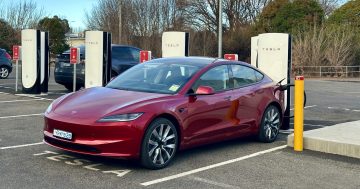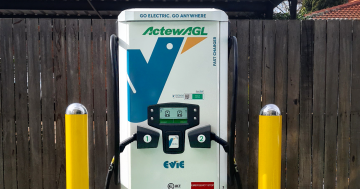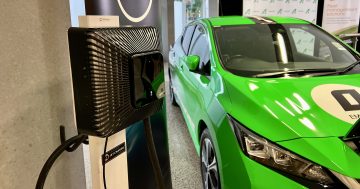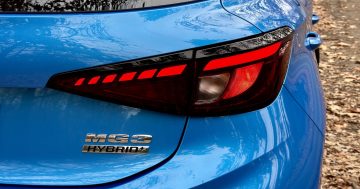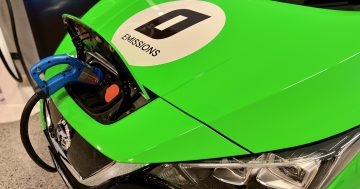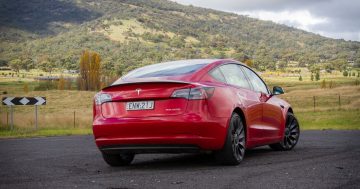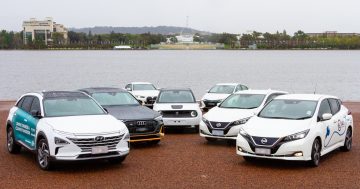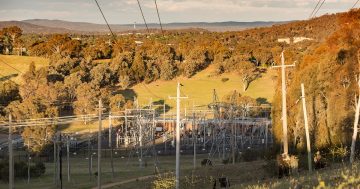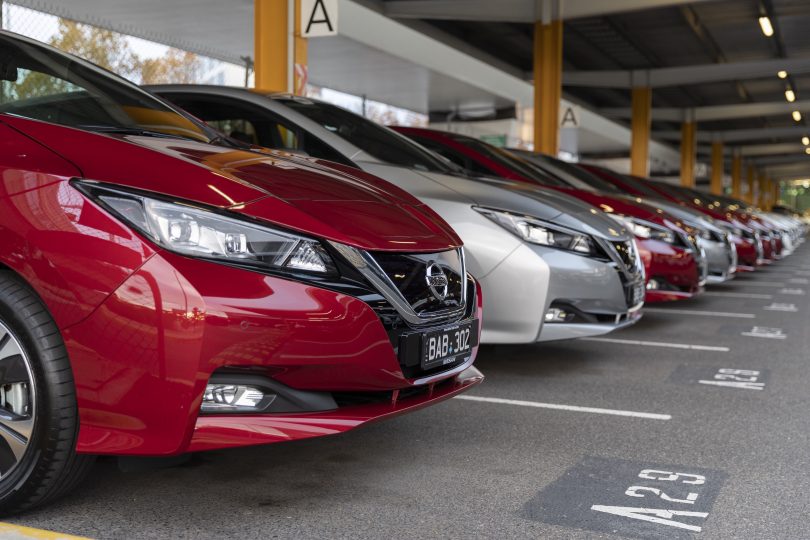
Test drive the Nissan Leaf at the Canberra community electric vehicle bulk buy launch. Photo: Supplied.
Keen to plug-in to the electric car revolution but worried about the cost, range anxiety and servicing?
Australia’s only all-electric car dealers are coming to Canberra to show off a range of EVs and host a month-long community education program from 25 February to 26 March, starting with a launch at the Kambri Cultural Centre at the ANU.
The Good Car Company bulk-buys low-mileage EVs at auction from Japan and the UK, cutting costs and overheads along the way to deliver affordable cars, with the overall aim of boosting the number of EVs on Australian roads and building a viable market.
Purchases are by order, and mostly driven by bulk-buy events.
The unlikely used car dealers behind the Good Car Company are three environmental and sustainability experts from Tasmania – Anthony Broese van Groenou, Anton Vikstrom and Sam Whitehead.
They originally considered converting Australian vehicles but realised how laborious that was and looked across the ditch to New Zealand where there are now 14,000 EVs, mostly imported from Japan where, because of legislation, there is a high turnover of used vehicles.
Mr van Groenou said Canberra would see a range of Nissan Leafs, starting at $17,000, and a Nissan e-NV 200 commercial van, which come as 2, 5, and 7-seaters.
He said Australia could not afford to wait to make the transition to EVs, and he and his partners saw an opportunity to put the foot down and accelerate the uptake.
It was also a way to lobby government and promote the benefits of decarbonisation, cleaner air and quieter neighbourhoods.
The Canberra trip comes after successful community bulk-buy programs in Tasmania and Victoria, and as US car giant GM became the latest automaker to announce the switch to electric.
The clock is ticking for the internal combustion engine with countries such as the UK banning the sale of petrol-driven cars and vans from 2030, and China forging ahead with the manufacture of EVs, including autonomous vehicles.
While other nations are preparing for the inevitable, offering incentives and setting policy for the transition, Mr van Groenou fears Australia will be left behind and face additional costs to modernise.
”We’re going to end up being the dumping ground of all the old stuff, diesel and petrol cars,” he said, although he praised the ACT’s leadership on its car fleet, buyer incentives and charging infrastructure.

Good Car Company co-founder Anthony Broese van Groenou: EVs are cleaner, faster, cheaper to run and more fun.
But a discussion paper released by the Morrison Government informing the development of Australia’s Future Fuels Strategy rules out any incentives for people to buy electric vehicles.
Which is where community action comes in to play.
”It was community action and bulk buys that really kicked off the solar revolution. And that’s what we’re trying to do here,” Mr van Groenou said.
He said affordability was the key to the transition and a goal of the bulk-buy model, but he said once someone had driven an electric car they don’t look back.
”They drive cleaner, they’re faster, they’re way more fun, more responsive and cheaper to run,” he said.
He said the operating cost was about a sixth of a current vehicle and maintenance, due to having fewer moving parts, was also a fraction of the cost.
”If we’re able to reduce that upfront capital cost then you get a return on your investment,” he said.
Mr van Groenou said the imposition of road user charges at this stage of development was madness and would be a disincentive to uptake, urging governments to wait until there were enough EVs on the road.
He said fears that EVs would break the electricity grid would only be realised if the transition was unplanned but smart charging technology and demand management to ensure power was drawn down at the cheapest and most optimal times would prevent those issues.
The uptake of vehicles with bidirectional technology, where EVs could also feed power into the grid, would also help to balance out the system.
Local energy company Evoenergy is participating in the $1.6 million EV Grid: Enabling Electric Vehicle Friendly Networks and Neighbourhoods trial to understand more about how electric vehicle charging impacts the network.
Funded by the Australian Renewable Energy Agency (ARENA), the trial will be led by Jemena in partnership with AusNet Services, Evoenergy, TasNetworks and United Energy to install smart, efficient wall chargers in the homes of participating electric vehicle owners to observe the effect charging patterns have on network demand, and manage and optimise when charging occurs.
Local sustainability group SEE-change is partnering with the Good Car Company for the event.
The Canberra community electric vehicle bulk buy launch
When: 6:30 pm to 8:30 pm, Thursday 25 February
Where: Courtyard of Kambri Cultural Centre, Australian National University Building 153, University Ave, Acton. The event will be held outside in the courtyard.
Registrations: Due to COVID-19, limited in-person tickets are available. Register to attend in person at Good Car.
Livestream via The Good Car Company Facebook page.












